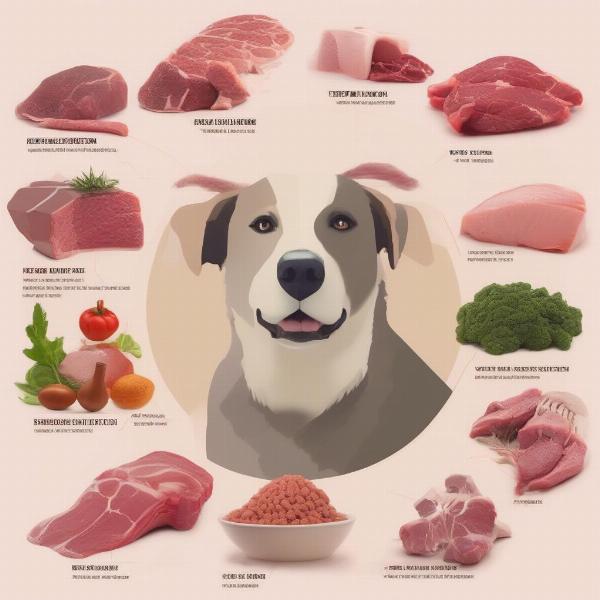The carnivore diet for dogs has gained significant traction in recent years, sparking both interest and controversy among pet owners. But what exactly is a carnivore diet, and is it a healthy and sustainable option for your canine companion? This comprehensive guide will delve into the intricacies of the carnivore diet for dogs, exploring its potential benefits and risks, providing practical tips for implementation, and addressing frequently asked questions to help you make informed decisions about your dog’s nutrition.
Understanding the Carnivore Diet for Dogs
The carnivore diet, as the name suggests, consists primarily of animal products, excluding all plant-based foods. This typically includes muscle meat, organ meats, bone, and sometimes eggs and dairy, depending on the specific approach. Proponents of the carnivore diet for dogs argue that it mimics the diet of wild canids and can alleviate various health issues in domestic dogs, such as allergies, digestive problems, and skin conditions.
 Carnivore Dog Food Ingredients
Carnivore Dog Food Ingredients
However, it’s crucial to acknowledge that the carnivore diet for dogs is a restrictive dietary approach and can pose potential risks if not implemented correctly. Nutritional deficiencies are a major concern, as eliminating plant-based foods can deprive dogs of essential vitamins, minerals, and fiber. Therefore, careful planning and monitoring are essential to ensure your dog’s nutritional needs are met on a carnivore diet.
Implementing a Carnivore Diet for Dogs: Key Considerations
Transitioning your dog to a carnivore diet should be done gradually to minimize digestive upset. Start by introducing small amounts of raw or cooked meat alongside their current diet and gradually increase the proportion of meat over several weeks. It’s crucial to choose high-quality, human-grade meat and organ meats from reputable sources.
Variety is also important to prevent nutritional deficiencies. Incorporate different types of muscle meat, organ meats (liver, kidney, heart), and bone to provide a broader spectrum of nutrients. Supplementation may be necessary to ensure your dog receives adequate levels of certain vitamins and minerals that may be lacking in a strictly meat-based diet. Consulting with a veterinarian or a veterinary nutritionist is highly recommended before starting a carnivore diet for your dog. They can help you assess your dog’s individual needs and create a balanced and safe meal plan.
Potential Benefits and Risks of a Carnivore Diet for Dogs
While some dog owners report positive results with the carnivore diet, such as improved coat condition, reduced allergies, and increased energy levels, it’s important to weigh these anecdotal benefits against potential risks.
- Potential benefits: Some dogs may experience improvements in digestive health, skin and coat condition, and allergy symptoms. It can also simplify feeding for dogs with food sensitivities.
- Potential risks: Nutritional deficiencies, especially of vitamins and minerals, are a significant concern. Imbalances in calcium and phosphorus can occur if the diet is not formulated correctly. Digestive issues, such as diarrhea and constipation, can also arise during the transition phase or if the diet is not appropriate for the individual dog. carnivora for dogs
Is a Carnivore Diet Right for Your Dog?
The decision to transition your dog to a carnivore diet should be made carefully and in consultation with a veterinary professional. It’s not a one-size-fits-all approach, and what works for one dog may not be suitable for another. Factors to consider include your dog’s age, breed, health status, and individual needs. Regular monitoring through blood work and veterinary check-ups is essential to ensure your dog remains healthy and thrives on a carnivore diet.
Conclusion
The carnivore diet for dogs can be a complex and potentially risky undertaking. While it may offer certain benefits for some dogs, it’s crucial to approach it with caution, conduct thorough research, and seek professional guidance. A balanced and complete diet is essential for your dog’s overall health and well-being. Careful planning, monitoring, and regular veterinary check-ups are paramount to ensure your dog’s nutritional needs are met on a carnivore diet. pc’s pantry for dogs & cats inc
FAQ
- Is a carnivore diet natural for dogs? While dogs are classified as carnivores, their dietary needs have evolved over time, and domestic dogs can thrive on a more varied diet.
- What are the signs of nutritional deficiencies in dogs on a carnivore diet? Lethargy, weight loss, poor coat condition, digestive problems, and weakened immune system can be indicators of nutritional deficiencies.
- Can puppies be fed a carnivore diet? Puppies have specific nutritional requirements for growth and development, and a carnivore diet may not provide all the necessary nutrients.
- Is a carnivore diet more expensive than traditional dog food? Sourcing high-quality meat and organ meats can be more costly than commercial dog food.
- Can I transition my dog back to a regular diet after starting a carnivore diet? Yes, it’s possible to transition your dog back to a regular diet gradually, but it’s always best to consult with your veterinarian. butcher dog food
- What are some alternatives to a strict carnivore diet? A raw or cooked homemade diet that includes a balance of meat and vegetables can be a healthier alternative.
- How can I ensure my dog gets enough fiber on a carnivore diet? While fiber is not essential for dogs in the same way it is for humans, adding small amounts of pureed pumpkin or other low-carb vegetables can help with digestive regularity. vegan diet for dogs recipes
ILM Dog is a leading international pet website dedicated to providing expert advice and resources on all aspects of dog care and nutrition. We offer a wealth of information on dog breeds, health, training, nutrition, and much more. From puppy care to senior dog care, we cover every stage of your dog’s life. Contact us today for all your dog-related needs! Email: [email protected], Phone: +44 20-3965-8624. ILM Dog offers comprehensive guidance on various dog care aspects, including breed selection, health, training, nutrition, grooming, and product recommendations.